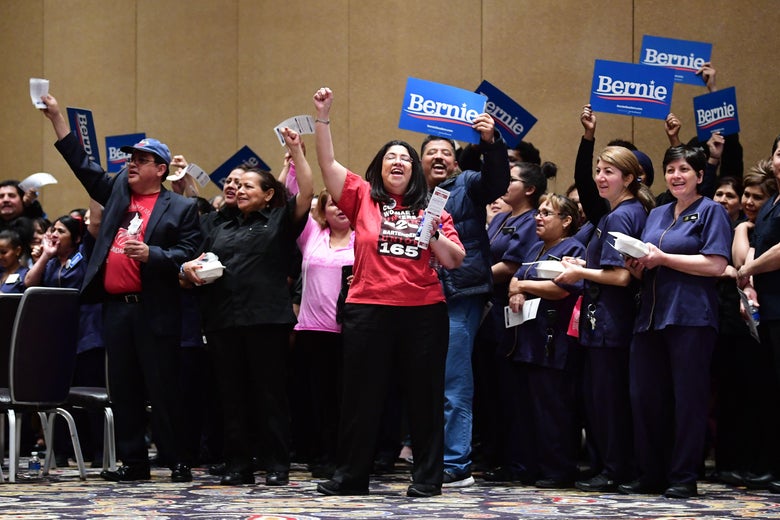
Bellagio hotel workers hold Bernie placards before casting their votes during the Nevada caucuses to nominate a Democratic presidential candidate at the Bellagio Hotel in Las Vegas, Nevada February 22, 2020.
Frederic J. Brown/Getty Images
In the final two weeks before Saturday’s Democratic caucuses in Nevada, the political discussion—including part of the nationally televised presidential debate—revolved around union members and what they wanted. The powerful Culinary Union Local 226 had warned its membership that Medicare for All, as championed by Vermont Senator Bernie Sanders, would jeopardize their hard-won health benefits. Here was the long-running Democratic argument over whether universal health care should replace existing benefits, played out in direct and particular terms.
And on Saturday at the Bellagio Hotel and Casino caucus site, there were the union members, wearing their work uniforms—many of them accessorized, despite the leadership’s message, with “Unidos Con Sanders” stickers.
Monica Smith, a union member who said she had supported Hillary Clinton both in the 2008 and in 2016 caucuses, said she was supporting Sanders now because of his health care position, not in spite of it.
“I am now a Bernie Sanders individual,” Smith said, “because I believe—number one—he is experienced and—number two—everything he talks about for health care, I believe in.”
According to NBC’s entry polling, 25 percent of the Nevada electorate was made up of union members and that group went decisively for Sanders. The Vermont senator took 34 percent of the union vote to 19 percent for Vice President Joe Biden, 15 percent for Pete Buttigieg, and 11 percent for Sen. Elizabeth Warren.
Without offering an official endorsement for another candidate, the leadership of Local 226 had spent lead-up to the election criticizing Sanders’ health care plan—saying in a published scorecard it would “End Culinary Healthcare”—and the senator’s supporters for online abuse towards union leaders. Even just before the Bellagio caucus began, Bethany Khan—the director of communications for local 226—was telling reporters that the volume of abuse from Sanders’ supporters was “still very high.”
The members at the Bellagio, though, many of them taking a break from their jobs to caucus, seemed to take the broader perspective on the question of health coverage. “All of our people deserve health insurance,” Smith said. “Not just me because I fought and won it through a culinary contract, but I think that my children who may not work in this field, they go to school, they deserve health care. And I don’t believe that Bernie’s going to try to take away what we have won through years and years of bargaining.”
On Saturday, thanks in significant part to union supporters like Smith, Sanders looked headed towards a significant victory in the Nevada caucuses, according to entry polling and early returns. That win would place him in the clear frontrunner position for the Democratic nomination with Super Tuesday less than two weeks away.
Of the 123 mostly culinary workers who turned up at the Bellagio site, 76 ended up caucusing for Sanders, 45 ended up caucusing Biden, two ended up non-committed, and nobody else received any final-tally votes. Warren had a disastrous showing among these caucus-goers, garnering just 6 votes in the initial alignment and failing to meet the threshold for the second alignment. Ultimately, of the 51 delegates committed from this precinct, 32 went to Sanders and 19 went to Biden.
During the Nevada campaign, Sanders’ team pushed back against the suggestion that his plan would hurt union workers without challenging the union itself. When I asked Sanders senior aide Jeff Weaver about the rift at Wednesday’s debate, he repeatedly declined to criticize the culinary union or say that its scorecard was misleading.
“We have great respect for culinary. Bernie has great respect for culinary. We’re just going to talk to voters and make our case, that’s all,” he said.
He added that under Sanders’ plan, the union’s state-of-the-art Vegas clinic, “will stay open.”
The Sanders campaign on Friday announced that its get-out-the-vote operation in Nevada, meanwhile, had knocked on 500,000 doors. The campaign’s message on health care resonated with Smith and other culinary workers.
Aramas Walker, another union member, said that he supported Hillary Clinton in 2016 because of “name recognition,” but was supporting Sanders this time, citing Medicare for All.
“The thing about the health care, this whole discussion, my thing is this: Bernie’s plan is better for not only everybody in the nation but it also covers things, some of the things that our health plan itself doesn’t cover,” he told me. “So, there’s this thing where ‘You lose your health care,’ but I’m like, what are you really losing?”
Holding on to their current individual benefits, the caucus-goers said, wasn’t enough reassurance in a system where healthcare coverage is unreliable. “I believe that when I sit with the people for Bernie Sanders and they say that they respect what we fought and won as culinary—he saw what happened to us with Obamacare, our copays are astronomical,” Smith said. “I do believe that he is right that, if I lose my job due to termination or illness, what do I get for health insurance and how do I get that back?”
“If we had universal for everyone, I would at least know that I had something to fall back on,” she added.
Readers like you make our work possible. Help us continue to provide the reporting, commentary and criticism you won’t find anywhere else.
Join Slate Plusfrom Slate Magazine https://ift.tt/2Va7JzT
via IFTTT
沒有留言:
張貼留言